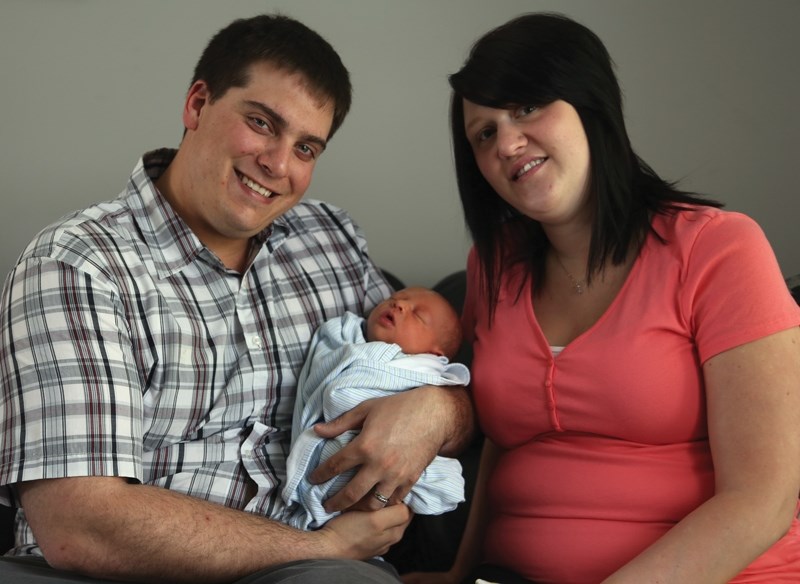Mom and baby are doing fine after what ended up being a regular delivery, but the lead-up was anything but.
Vanessa O’Quinn and her husband Tyler went into labour late on May 24, and headed to the Westlock hospital, where they had done all their prep work over the previous nine months.
When they arrived at the hospital at around 11 p.m. that night, they learned their entire birth plan pretty much had to be thrown out.
“Right away they inform us, ‘we have no maternity,’” Vanessa said. “They never elaborated; they just said ‘we have no maternity.’”
Staff checked Vanessa in nonetheless, to make sure she was doing fine, but the question of what ‘no maternity’ meant remained.
“We asked them and they said there’s no staff,” she said.
Apparently the maternity ward staff did not want to work overtime, Vanessa explained, which meant the doctors would not come in either, as they wouldn’t have nurses to work with.
With no maternity nurses and their doctor not forthcoming, and Vanessa’s contractions coming at the intervals when you’re encouraged to head to the hospital, the couple was in a bind.
They had prepared to have their first child in their hometown hospital, and were now faced with the virtual inevitability of having to go to either Barrhead or the Sturgeon Community Hospital in St. Albert to have their baby.
“Being told to go somewhere else at midnight, at this point in time, is pretty devastating for a mom in labour, to say the least,” Tyler said.
They made the decision to head over to the Barrhead hospital, fully aware they would be dealing with a medical team they were not familiar with, as their doctor had said she wouldn’t be there.
“She can’t just follow us to another hospital,” Tyler said. “That’s not the way it works.”
At Barrhead, the couple’s experience was smooth as far as the delivery went, with baby Easton being born in the morning of May 25.
“The staff were fantastic; I have nothing but praise for them,” Tyler said.
On the other hand, their experience in Barrhead was not without its own concerns — such as an apparent lack of communication between the Westlock and Barrhead facilities.
“They weren’t in contact at all knowing that the Westlock hospital was telling their patients there to go to either Barrhead or Sturgeon,” Vanessa said.
And that wasn’t the first time the couple had seen poor communication that evening.
While still in Westlock, they met a nurse who worked in the west wing, where the maternity ward is located.
“She was working in that wing and had no idea of the maternity shutdown,” Vanessa said.
There were also problems with the couple’s paperwork. Barrhead staff were surprised to learn the couple hadn’t filled out their pre-registration forms. Except they had, and the Westlock hospital had seemingly misplaced them.
So Tyler and Vanessa went about filling them in again, whereupon the Westlock hospital found them.
“It was a gong show,” Tyler said.
The couple’s experience that night has caused Vanessa to do some hard thinking.
“It’s just at the point now, I’m considering with my next child, not to even bother with the Westlock hospital,” she said.
She added there are other women in the community who refuse to have their children at the hospital, and were “shocked” to learn she had planned on having Easton there.
Ultimately, all the aggravation of that evening is a footnote for the couple, because, as Tyler said, “baby’s good, momma’s good.”
And while they’re still not impressed with how the evening started, they’re not seeking anything more than to tell their story and hope that means no one else will go through what they did.
“Obviously it’s not going to happen all the time, but the more people who hear about this, they’re going to be, ‘wow, it could be closed another time,’” Vanessa said. “You’re not going to be able to keep women in this area having their babies in their local hospital if, as it is already, they’re not hearing great things about it.”
“We don’t close the maternity or obstetrics ward on weekends; that’s not practice,” said Shelly Pusch, chief zone officer for the north zone with Alberta Health Services.
She did say ward closures do happen on “rare occasions,” but could not speak to the specifics of the closure that affected the O’Quinns.
“On rare occasions when staff with obstetrics training are not available, we may have to look at protocols to send patients to alternate locations,” Pusch said.
When it comes to women who arrive at a hospital in labour, however, no matter the state of that hospital’s maternity ward, services will be provided.
“All expectant mums, women, when they do come to the hospital, would be seen and assessed by a nurse and a physician, and then they would determine if transfer is necessary,” she said.
And if labour has progressed enough, “we’ll find a way to deal with that in the best circumstances possible.”


